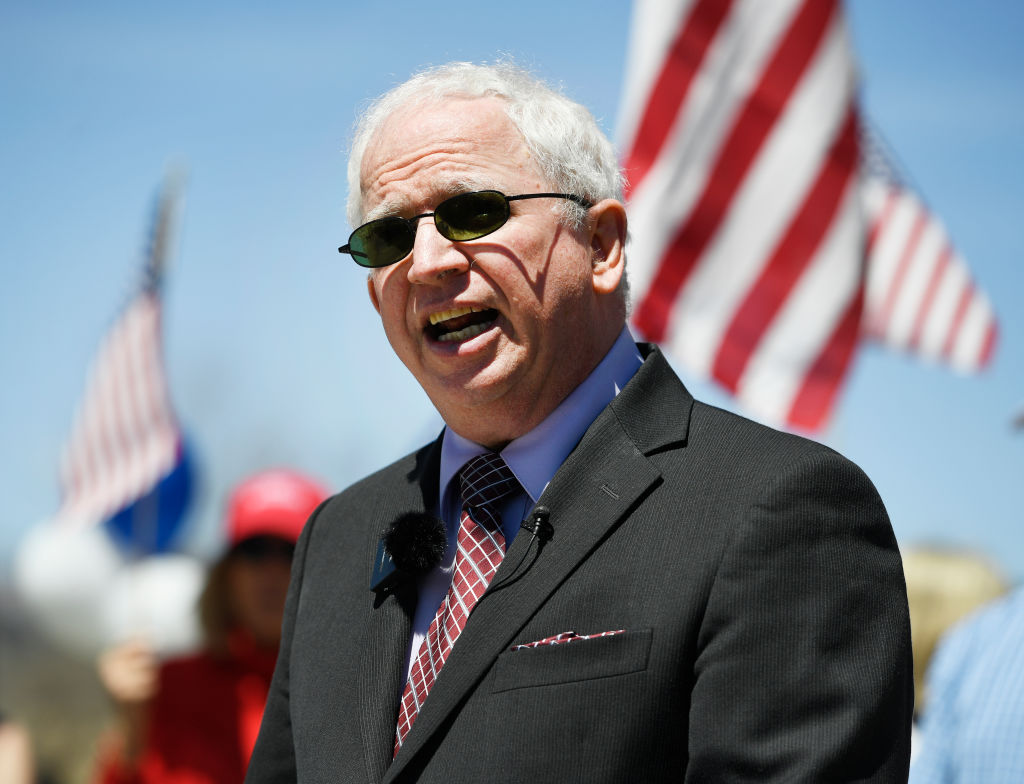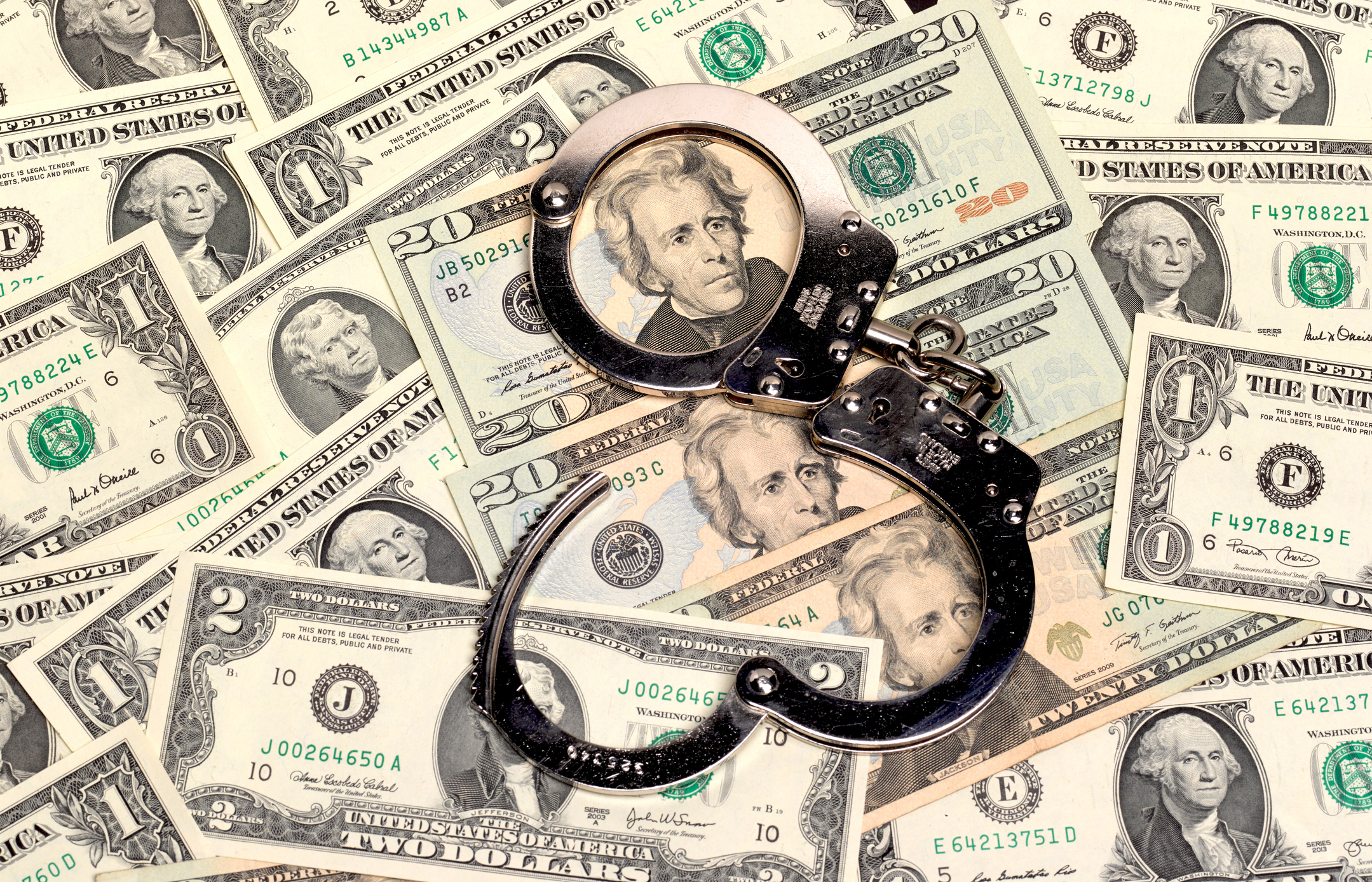A new America First organization steps into the fray.
The Unpersoning of John Eastman

The regime is set on full-spectrum destruction of its enemies.
John Eastman is a legal scholar of the first rank. He has argued before the Supreme Court, testified in Congress, and cultivated a deserved reputation as an expert in constitutional law. He has practiced at a prestigious law firm, served as both professor and Dean at Chapman University law school, and, of course, represented many notable figures, including Donald Trump. Unlike many lawyers, he earned a reputation for integrity, intelligence, and moral courage. Like all lawyers, he maintained a bank account with a major financial institution and, of course, a state license to practice law—in his case, in California, one of the hardest bar licenses to earn.
Those sound like the trappings of a good life—the reputational and material fruits of a lifetime of honest hard work. It used to be the case that once earned, such fruits were then possessed of right. And no person—certainly no American—would dare to deprive Eastman of his right to them merely because of his legal work or political speech. Indeed, it was not so long ago that even suggesting as much would have been considered un-American. Not any longer.
Today, extremely powerful people in government, high-finance, big law, big business, state bar associations, academia, and elsewhere have decided to destroy John Eastman because of his legal work and political speech on behalf of Donald Trump in late 2020 and early 2021. Some hated his courageous challenge to “their” democracy. Others feared his intellect. Still others saw an opportunity to increase their middling stature by bringing low a greater mind, while fantasizing that by disagreeing with Eastman they fulfilled an “oath to God.” All have worked to destroy Eastman because he challenged the regime.
George Orwell called this coordinated process of erasing one’s official identity “unpersoning.” By depriving John Eastman of his employment, employability, law license, reputation, access to money, and even his freedom, the regime seeks to send a message. That message is not to John Eastman. It is to you: Don’t you dare challenge the regime, or you too will be unpersoned.
Take His Law License
The regime is stocked with clever lawyers at big law firms and non-profit activist organizations. Recently, these clever lawyers have stumbled upon a new lawfare tactic: deprive their opponents of access to the courts by depriving them of lawyers. Organizations like the 65 Project and States United Democracy Center (SUDC) exist to take the licenses of lawyers with the courage to advance legal actions that threaten the regime. After Biden’s inauguration, they targeted John Eastman.
On October 4, 2021, SUDC filed a 30-page complaint against Eastman with the State Bar of California, where Eastman is licensed. On July 28, 2022, the 65 Project filed a similar complaint with the Supreme Court of the United States. These memoranda attempted to persuade the licensing authorities to disbar Eastman, arguing that his advocacy on behalf of Donald Trump amounted to conduct “unbecoming a member of the Bar.” In April, SUDC succeeded. Following a 35-day trial, Judge Yvette Roland (a partisan Democrat) issued a 138-page order recommending that Eastman lose his license.
A judicial order is supposed to be the product of a rigorous application of the law to the facts. Roland inverted that process. She applied SUDC’s facts to Eastman’s legal analysis—taking as fact that there was no fraud in the 2020 election and reaching her own conclusions about confusing legal issues (like the Electoral Count Act) to conclude that Eastman’s lawyering must have been dishonest. This inverts the very purpose of adjudication.
At any rate, Judge Roland persisted. In concluding, she recommended that Eastman be disbarred because he: (1) signed off on a motion to intervene in Texas v. Pennsylvania, a case brought by the state of Texas challenging the election laws in Pennsylvania and elsewhere; (2) “provided legal advice on Trump v. Raffensperger, a case filed against the Georgia Secretary of State; (3) “signed a Verified Complaint” in Trump v. Kemp; (4) “worked mightily…to encourage Republicans in the seven ‘contested states’ to” meet and vote on alternate slates of electors; (5) “drafted and sent a two-page legal memorandum” to some Trump attorneys; (6) appeared on Steve Bannon’s War Room; and (7) wrote an article in The American Mind.
In other words, Eastman helped to bring lawsuits in various courts, wrote and filed complaints, wrote legal memos, and “worked mightily” to get state legislators to vote. He also appeared on television and wrote articles. If you suspect these activities are routine for litigators, you’re right. Eastman’s sin, however, was doing them on behalf of Donald Trump.
Roland twisted herself into knots explaining why the seven points listed above were unethical, drawing factual findings and legal conclusions of astonishing breadth in the process. Among others, her findings include: the First Amendment does not protect Eastman’s political speech on Bannon’s War Room, his article in The American Mind, or even the things he said to Vice President Pence, because this speech was “false” and “employed as a tool in the commission of a crime.” It was false, Judge Roland assured us in circular fashion, because “the 2020 presidential election was the most secure in American history” and “the court has already determined that [no] fraud occurred in the 2020 election” (points I refute here and here). And they were in furtherance of a crime because a beleaguered district attorney in another state charged Eastman with one. This isn’t legal reasoning, it’s a perverse combination of bootstrapping and begging the question.
Next, Roland determined that a complaint filed with the United States Supreme Court by the State of Texas was “false” because it argued that Pennsylvania (and other states) violated the Constitution in ignoring their own election laws. Having determined that the arguments were “false,” she heaped responsibility on Eastman because he moved for Trump to join Texas as a plaintiff, thereby tacitly adopting Texas’s “false” arguments. This is weird, since Justices Alito, Thomas, and Gorsuch stated “there is a strong likelihood that [Pennsylvania] violate[d] the Federal Constitution,” just as Texas and Eastman said.
Roland also dismissed a century’s worth of legal wrangling about the meaning of the Electoral Count Act, the 12th Amendment, and the role of State legislatures, Governors, and the Vice President in certifying and counting electoral votes. In sweeping this morass aside, she simply declared that Eastman’s legal interpretation of these issues was a “lie,” repeatedly declaring in her order that “the court has already determined…that Eastman’s statements…regarding the powers of the Vice President were false.” But her court does not have the jurisdiction to “determine” any of these constitutional or election integrity issues. Indeed, other than vis-à-vis Eastman’s law license, Roland’s determination has no more authority than would your book club, were it to “determine” the scope of the First Amendment, the meaning of the 12th Amendment or Electoral Count Act, or the existence of election fraud throughout the land in 2020.
The idea that a single judge with no constitutional law experience, in a backwater non-federal court with narrow subject-matter jurisdiction, in a single state, had the authority or capacity to make sweeping legal pronouncements that span the entire continent and 200 years of jurisprudence, is, well, not serious. But Roland had to make these findings to justify taking Eastman’s law license. So, she did. The outcome was predetermined.
Debank Him
If the 65 Project, SUDC, and Judge Roland at least gave “reasons” to deprive Eastman of his capacity to earn a living, Bank of America and USAA have no such scruples. They’re more than content to unperson Eastman without even an explanation.
More than a decade ago, when political debanking first came to the public’s attention, banks went out of their way to blame the industries in which their former customers operated. Gun manufacturers and ammunition dealers, tobacco sellers, pornographers, and others made easy targets precisely because they operated in controversial industries. Their controversial nature was a convenient cover for banks. The banks cited “reputational concerns” when they closed the accounts of companies in those industries.
Having inured the American public to the fact of debanking, however, woke institutions like Bank of America dispensed with the cover and expanded their attacks to include Christians and other groups disfavored by the regime. Today, “debanking” is obviously part of the unpersoning playbook. Bank of America is notorious for unpersoning those on the political right and is powerful enough to scoff at attempts to restrain its misconduct. It is so powerful, in fact, that it lies about its politically-motivated debanking with impunity.
Thus, it was no surprise that in September 2023, Bank of America debanked John Eastman, closing his accounts and denying him access to essential financial services (such as, for example, paying for things). It did all of this without so much as an explanation, Eastman’s 40-year relationship with the bank notwithstanding. USAA Federal Savings Bank followed suit shortly thereafter, debanking Eastman in November of last year.
The banks’ decision to unperson John Eastman in California may have been occasioned by a separate decision in Fulton County, Georgia to unperson Donald Trump, John Eastman, and 16 others by indicting them for political crimes against the regime. That indictment, unsealed in August 2023, would have given Bank of America and USAA the pretext to pretend that the Bank Secrecy Act required them to debank Eastman and not to tell him why.
Given my experience as a white collar prosecutor for DOJ, it wouldn’t surprise me if both banks drafted “suspicious activity reports” suggesting that Eastman engaged in money laundering, perhaps by raising money for his legal defense on GiveSendGo. If so, the idea that this is money laundering is preposterous and they know it. (Full Disclosure: I recently gave to Eastman’s defense on GiveSendGo and encourage you to do so as well.)
Bankrupt Him and Take His Freedom
In “Criminalizing Trivialities” and “Show Trial, American Style,” I explained how left-wing prosecutors use “fraud-type” offenses to shoehorn political activity into the four corners of a criminal statute, abusing the legislative intent behind those statutes in the process. That’s exactly what Manhattan DA Alvin Bragg and federal prosecutor Jack Smith have done to Donald Trump.
It’s also exactly what Fulton County District Attorney Fani Willis did to the former president and 18 others who worked with him, John Eastman included. I won’t provide a detailed takedown of Willis’s case here. Instead, I observe only that Willis charged Eastman with crimes like impersonation, forgery, false statements, filing false documents, and conspiracy to do the foregoing. These are the same “fraud-type” offenses abused by Bragg and Smith, which I addressed in those other articles. These statutes are not germane to the alleged facts underlying Willis’ indictment of Trump and Eastman, even if those facts are true. White collar prosecutors without a political axe to grind understand this point.
But, like the 65 Project, SUDC, Judge Roland, Alvin Bragg, Jack Smith, Bank of America, and USAA, Fani Willis has a political axe to grind. As such, she’s more than willing to serve her role in the unpersoning process, doing her part to drown Eastman in legal bills and, if she has her way, incarcerate him.
Destroy His Reputation and Get Him Fired
Shortly before Biden took office, more than one hundred Chapman University faculty mounted a pressure campaign to terminate John Eastman from his position as tenured professor and Dean of Chapman University Law School, his competent stewardship notwithstanding.
Everybody knows that the purpose of tenure is to secure academic freedom. Historically, this principle would have been sufficient to rebuff these attacks. But, with the Left’s new dedication to unpersoning, lofty principles like academic freedom don’t weigh in the balance. Eastman’s refusal to bend his knee to regime shibboleths and his vigorous defense of our constitutional order against regime corruption were all the evidence such faculty needed when they signed their “letter of outrage.” Though it’s worth noting that none of the law faculty signed the letter, it had its intended unpersoning effect. Eastman resigned his positions with the law school despite having spent his entire academic career there.
In less than than 20 years, the regime has normalized the process of unpersoning. We’re inured to it. But we haven’t seen the end. Indeed, as described above, the regime already prosecutes its political opponents while conditioning ongoing employment, access to banking services, and maintenance of professional licenses on obeisance to accepted narratives. These were the hard cultural norms to breach. As such, we should expect unpersoning to spread to less weighty things like access to cell service and internet providers, mortgage lenders and commercial airlines, sports teams and entertainment venues, restaurants and movie theaters. I anticipate we will see more unpersoning before we see less. At least, until we learn to fight back.
How do we do that?
More than 200 years ago, John Adams defended the legal rights of unpopular British sailors wrongfully accused of murder. At the time, he was criticized by his fellow countrymen. But history weighed in, and for the ensuing two centuries, Americans in general and lawyers in particular celebrated Adams for his courageous defense of politically unpopular defendants. We held Adams up as an exemplar of legal courage. This is the future for John Eastman. When the dust settles, he will be celebrated for his courage and his unfaltering conviction. In the present, however, we must continue fighting the corruption of our legal system, our culture, and our government by the lesser figures mentioned in this essay.
John Eastman shows us how.
The American Mind presents a range of perspectives. Views are writers’ own and do not necessarily represent those of The Claremont Institute.
The American Mind is a publication of the Claremont Institute, a non-profit 501(c)(3) organization, dedicated to restoring the principles of the American Founding to their rightful, preeminent authority in our national life. Interested in supporting our work? Gifts to the Claremont Institute are tax-deductible.
The regime has lost all perspective and decency in its war on its perceived enemies.
The regime’s effort to bankrupt its opponents must be stopped.



